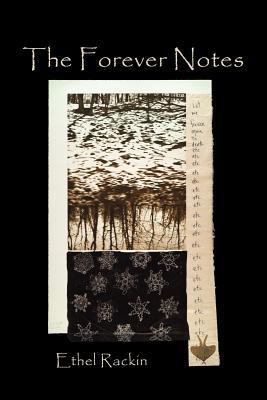|

The Forever Notes
Ethel Rackin
Parlor Press
2013
67 pages
Ethel Rackin’s The Forever Notes is an emotional experience for the reader in that each poem in the collection is genuine. Rackin’s writing highlights the imagery and sound that make poetry such a joy through minimalist techniques. The three sections of this book are “Notes,” “Pictures,” and “Songs,” and the progression from one to the next feels natural. The first section is aptly named in that each poem communicates how we expect slips of paper left for one another to do. Here is the entirety of “Meet me in the cabin”: “Meet me in the sea / Meet me where our love’s a shirt / Drenched, dried out, and drenched once more.” Like inviting a lover to come closer, this speaker relies not on construction of the thoughts as much as the beauty of the words themselves. Though the focus of the content shifts throughout, Rackin’s poems are consistently concerned with simple, heart wrenching communication.
Later in the first section, the poem “Sleep Song” sets up the transition into “Pictures” through repetition, one of Rackin’s most well-handled techniques: “I want to remember the picture / Wander into the picture / Thread the threads of sheep in the picture.” This poem creates a desire for memory and understanding of imagery that drives the second section from the very beginning. The first poem in “Pictures,” “Amanda,” demonstrates an intriguing stylistic shift: “There is a small girl named Amanda. / Like me she is small from the start / and has strong allergies to people and conditions.” It is almost as if the speaker’s primary concern is getting the reader to comprehend basic ideas, but here, the reader needs to be able to see what the speaker sees. In “Museum,” this is a very important concept as even the speaker watches from a distance: “They are walking around a small museum / located in a depressed area. / In several corners bulbs have been hung. / Metal flowers with faces like people.” Again, simplicity is breathtaking in Rackin’s work, and the reader can only hope to be so observant.
The final section, “Songs,” is an amalgamation of these techniques. Repetition, note taking, imagery, and music are all present here. “Before Everything” is a kind of love song that shines: “you whom I have always loved / as an out-of-tune violoncello / as a bird caught on its wing.” A cornerstone of this collection is “Ode to the River,” which stands out for the speaker’s fixation on the river and this gorgeous honesty:
River, you are long and wide—
a lick away in the mind
and a lick away in time.
Flowing in, you flow out of passion too.
Too injurious to see your own reflection
you are not a narcissistic river and neither am I.
For I have forgiven you and your children,
the rivulets. I have forgiven the mountains
for staying and the birds for taking flight
off the high and middle and lower peaks.
This poem also succeeds in articulating the relationship between the speaker and the reader throughout this collection. The speaker in Rackin’s poems exists to tell us why the world is extraordinary and why it must be noticed. The Forever Notes does not come to us from a narcissistic river, but an openhearted and insistent one that readers will want to dive into more than once.
--Sarah Dravec
Sarah Dravec is a graduate student in the NEOMFA in Akron, Ohio, where she studies poetry. She is a poetry editor for Barn Owl Review. Her work has appeared or is forthcoming in And/Or, Blast Furnace, Bone Bouquet, Dressing Room Poetry Journal, *82 Review, and others.
Also by Sarah Dravec:
Review of Glass Armonica by Rebecca Dunham
Review of Vivarium by
Natasha Sajé
Review of Phrasebook for the Pleiades by Lorraine Doran
|
|

